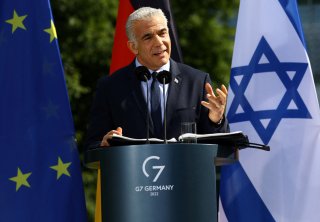Israeli Prime Minister Lobbies Against Iran Nuclear Deal in Berlin
Israeli prime minister Yair Lapid traveled to Germany on Sunday as part of a campaign to urge Western nations not to adopt a renewed nuclear agreement with Iran.
Israeli prime minister Yair Lapid traveled to Germany on Sunday as part of a campaign to urge Western nations not to adopt a renewed nuclear agreement with Iran, days after Western leaders expressed dissatisfaction with Iran’s most recent proposals on the deal’s final text.
During his visit to Berlin, Lapid is expected to meet with President Frank-Walter Steinmeier, Chancellor Olaf Scholz, and Foreign Minister Annalena Baerbock, according to Germany’s state-run Deutsche Welle news agency.
The Israeli leader’s visit to Germany was preceded by a weekend statement by Germany, Britain, and France—three of the six members of the “P5+1,” alongside the United States, Russia, and China—expressing concerns about Iranian demands related to the pact. Lapid praised the statement, claiming that the three nations had taken a “strong position” and thanking them for their support.
Israel and Iran have remained perennial adversaries in the Middle East since the Iranian Revolution in 1979, and Tel Aviv has largely opposed Western nuclear negotiations with Iran since their initiation in the early 2010s. Under former Prime Minister Benjamin Netanyahu, Israel strongly opposed the original Joint Comprehensive Plan of Action, the landmark 2015 nuclear accord in which Iran agreed to temporarily suspend its nuclear enrichment program in exchange for wide-ranging sanctions relief. Through influence on former President Donald Trump, Netanyahu played a key role in securing the United States’ withdrawal from the original deal in 2018.
Although Lapid has opposed Netanyahu politically within Israel, the two leaders appear to agree on opposition to the Iran nuclear deal, and both Lapid and his coalition partner, Naftali Bennett, have pushed against the Biden administration’s participation in renegotiation efforts. The Israeli leader claimed to his cabinet earlier in the month that Israel had been “conducting a successful diplomatic drive to halt the nuclear deal and prevent the lifting of sanctions on Iran … It’s not over yet. The road is long. But there are encouraging signs.”
The prime minister’s visit comes after Iran’s most recent response to the European Union’s proposed final text of the renewed deal. Although the text of the response was not made public, Secretary of State Antony Blinken couched it in negative terms, calling it a step “backwards” from reaching a final agreement.
During his time in Germany, Lapid will also visit Wannsee, the site of the infamous Wannsee Conference, where Nazi leaders planned the implementation of the Holocaust, alongside several Israeli Holocaust survivors.
Trevor Filseth is a current and foreign affairs writer for the National Interest.
Image: Reuters.

